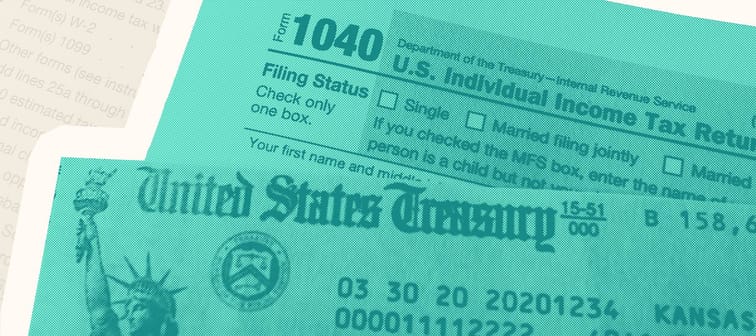How paperwork is slowing down tax refunds
National Taxpayer Advocate Erin Collins — whose organization lives within the IRS and acts as a kind of agency watchdog — notes that most delays are experienced by taxpayers who either filed paper returns or filed amended returns, which are processed as paper returns. In 2021, the agency received nearly 17 million Form 1040 paper returns, and millions more business returns were filed on paper.
Now consider two exacerbating factors:
-
IRS staffing lags U.S. population growth. The agency’s workforce is roughly the same as in 1970 — despite the country’s population growing by 60% since then. (The IRS recently announced plans to hire 10,000 workers to address its backlog, and President Joe Biden proposed a 6% increase in the agency’s 2022 budget.)
-
The agency’s data intake process can charitably be described as “legacy.” Collins notes that agency employees “manually transcribe all paper tax returns” — every digit, every letter. Even simple returns take time. Imagine the effort necessary to input exponentially more complex forms and schedules. Collins has called on the IRS to adopt scanning technology that would allow the agency to “machine read” paper returns and reduce manual data entry.
Until the IRS takes Collins’ advice, there will be plenty of room for error. In her report to Congress, Collins didn’t mince words: "The IRS is in crisis and needs to apply resources to its core mission — processing these returns and paying the corresponding refunds.”
The reliance on paperwork and manual data entry comes at a particularly bad time, as filers account for complex tax events in 2021, such as the child tax credit payments and pandemic stimulus checks.
As of late March, roughly 7 million unprocessed individual returns were awaiting action. The majority of those have errors or require elevated handling processes by the IRS, such as paper returns. Collins’ report to Congress amounts to a brutal report card on a government agency already accustomed to late-night lampooning over its bureaucracy and byzantine rules.
The report finds that call volume has risen sharply yet only about 11% of the more than 280 million calls to the agency were answered. Wait times for those lucky to get through averaged 23 minutes.
Invest in real estate without the headache of being a landlord
Imagine owning a portfolio of thousands of well-managed single family rentals or a collection of cutting-edge industrial warehouses. You can now gain access to a $1B portfolio of income-producing real estate assets designed to deliver long-term growth from the comforts of your couch.
The best part? You don’t have to be a millionaire and can start investing in minutes.
Learn MoreWhat you can do to speed up your tax refund
In any tax season, there are big steps filers can take to shorten IRS delays. And remember, you can check on your status at the IRS “Where’s My Refund” page.
Be sure to have your Social Security number, filing status (single, married, married filing jointly, etc.) and your exact expected refund amount ready.
Keep in mind that just because the IRS confirms it has received your return, the actual processing and issuing of the refund are separate steps.
Haven’t filed yet for 2021? Good news: The federal tax deadline is April 18, three days later than usual because Emancipation Day — a Washington, D.C., holiday — falls this year on April 15, the U.S. government’s traditional tax deadline.
That means even last-minute filers can make some moves this year — and in the coming years — to smooth the path to a refund:
- E-file your return. Until the IRS dumps its paper problem, mailing returns the old fashioned way (especially complex returns) invites delay. E-filing speeds your return to the IRS and allows filers to understand their status more quickly. Texts and emails from the IRS keep you updated when your return has been received, processed and a refund issued.
- Double-check your work. Ensure your full name is spelled correctly, and that other information — such as home addresses, names of charity organizations to which you donated, etc. — is accurate. Also double-check your bank’s routing number and the deposit account for the refund. Any discrepancy can put time back on the IRS’ clock and stall your refund.
- Avoid guesswork. Returns are routinely flagged for review because of simple discrepancies, such as a W-2 whose earned income amount is different from a filer’s estimated amount in the return.
- Watch out for stimulus mistakes. Many delayed returns in 2021 were caused by filers who incorrectly reported their 2020 stimulus payments. Those discrepancies also trigger reviews. Confirm how much you received by logging into your account at IRS.gov. There is a scenario where your early child tax credit payments could shrink your refund.
- Use direct deposit. Sign up to have your refund sent by direct deposit to your bank account. Doing this removes a crucial piece of paperwork and typically puts money in your pocket a week or more sooner.
The richest 1% use an advisor. Do you?
Wealthy people know that having money is not the same as being good with money. Advisor.com can help you shape your financial future and connect with expert guidance . A trusted advisor helps you make smart choices about investments, retirement savings, and tax planning.
Try it now








